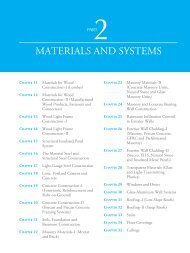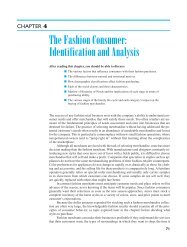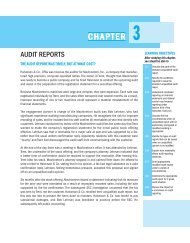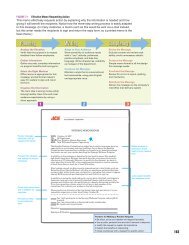Organizational Justice, Ethics, and Corporate Social Responsibility
Organizational Justice, Ethics, and Corporate Social Responsibility
Organizational Justice, Ethics, and Corporate Social Responsibility
Create successful ePaper yourself
Turn your PDF publications into a flip-book with our unique Google optimized e-Paper software.
CHAPTER 2 • ORGANIZATIONAL JUSTICE, ETHICS, AND CORPORATE SOCIAL RESPONSIBILITY 61<br />
FIGURE 2.12<br />
One Individual’s Ethical<br />
Misdeeds Leads Many<br />
to Suffer: An Example<br />
In the 1990s, the president of<br />
one local chapter of a United<br />
Way agency was accused of<br />
misusing agency funds.<br />
Although only one person was<br />
involved, other chapters were<br />
adversely affected as donations<br />
slowed to a trickle <strong>and</strong> 20<br />
percent of previous donors<br />
stopped giving altogether. It took<br />
5 full years before donations to<br />
this venerable charity recovered<br />
fully. The real losers, of course,<br />
were the millions of people who<br />
would have been helped by the<br />
agency’s efforts.<br />
TABLE 2.4 U.S. Laws Bearing on Ethical Behavior in Organizations<br />
Several federal laws have been enacted that reflect people’s disdain for unethical behavior in government <strong>and</strong> business organizations.<br />
Summarized here are some of the most important U.S. laws bearing on ethical behavior in organizations from the last quarter century.<br />
Law<br />
Year Enacted<br />
or Revised<br />
Description<br />
False Claims Act 1986 Provides mechanisms for reporting fraudulent behavior against U.S. government<br />
agencies <strong>and</strong> protects individuals who do so.<br />
Foreign Corrupt 1988 Prohibits company officers from soliciting business by paying bribes to foreign<br />
Practices Act<br />
officials<br />
Federal Sentencing 1991 Specifies guidelines for federal judges to follow when imposing fines on<br />
Guidelines for<br />
organizations whose employees engage in criminal acts. Its underlying rationale<br />
Organizations<br />
is that the more steps companies take to discourage criminal behavior by its<br />
employees, the less they will be penalized should such acts occur. This law<br />
specifies several actions which, if taken, will be recognized as efforts to<br />
discourage illegal behavior. As a result, companies are actively engaged in<br />
following these courses of action<br />
Sarbanes-Oxley Act 2002 Enacted to guard against future accounting sc<strong>and</strong>als, such as occurred at Enron,<br />
this law raises the st<strong>and</strong>ards that public companies must use to report accounting<br />
data. Specifically, this law has kept companies actively involved in monitoring the<br />
ethical behavior of their officers.<br />
Federal Prosecution 2003 A revision to the Federal Sentencing Guidelines for Organizations that is designed<br />
of Business<br />
to protect investors against unscrupulous acts by top executives (also in response<br />
Organizations<br />
to the Enron sc<strong>and</strong>al). The focus on boards of directors is intended to discourage<br />
unethical behavior, given that such individuals often are the only parties with<br />
sufficient clout to prevent wrongdoing by top company officials.<br />
Sources: See Note 50.

















